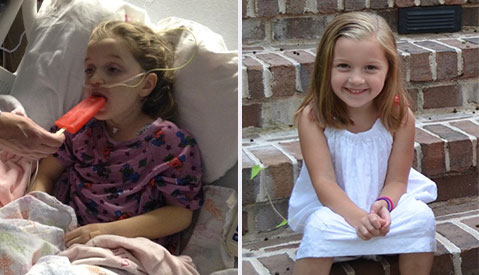Which Flu Vaccine Should Children Get? - HealthyChildren.org
By: Kristina Bryant, MD, FAAP
Many people don't realize how serious influenza (flu) illness can be, even for previously healthy kids and teens. (See "Why Flu Vaccines Top Our Back-to-School List Each Year," below.) Children also play a role in spreading the flu in their homes and communities.
Influenza viruses change yearly. All children age 6 months and older need a flu shot every year. Children should get their influenza vaccine when the shots become available, especially if they need two shots this season. That way they will be protected before flu starts circulating in your community. It takes about two weeks after the shot to build immunity.
Which flu vaccines are available?
There are two types of influenza vaccines available. The first is what many people call the "flu shot." The second comes as a nasal spray.
All the vaccines available for children this year protect against four different influenza viruses (two A and two B viruses). During flu season, multiple different flu viruses may circulate. Sometimes the viruses change during the flu season.
Should I get the shot or nasal spray for my child this year?
The American Academy of Pediatrics (AAP) and the Centers for Disease Control and Prevention (CDC) want as many children as possible to get a flu vaccine every year. Both types of flu vaccine (flu shot or nasal spray) can be given according to their indications for this flu season. Any licensed influenza vaccine available this year and appropriate for a child's age and health status can be given, with no preference.
Can kids get a flu vaccine and other vaccinations at the same time?
Yes. Each year, it is possible that flu, COVID-19, and other common viruses will spread at the same time. Sometimes, the vaccine is not an exact match with the strains in the community. But the vaccine still can protect against serious illness. Talk with your pediatrician about your child getting the flu vaccine along with other recommended immunizations. Flu vaccine can also be given at the same visit as nirsevimab, a long-acting monoclonal antibody indicated for the prevention of respiratory syncytial virus (RSV) infection. Learn more here.
If my child tested positive for COVID, when should they get a flu vaccine?
Children with COVID should get a flu vaccine after they have recovered from their COVID illness. Keep in mind that symptoms such as a stuffy and runny nose can make it hard to give the nasal spray vaccine.
What about allergies to flu vaccines?
A child who had an allergic reaction after a flu vaccine in the past should be seen by an allergist. The allergist can help parents decide if their child should receive their annual flu vaccination. A child with a known history of egg allergy can receive the flu vaccine without any additional precautions beyond those recommended for all vaccines.

Why Flu Vaccines Top Our Back-to-School List Each Year
By Jennifer Pool Miller
 Our daughter, Caroline, was very active, physically fit and healthy. She swam several times a week and participated in weekly gymnastics lessons.
Our daughter, Caroline, was very active, physically fit and healthy. She swam several times a week and participated in weekly gymnastics lessons.
She had been vaccinated against the flu every year, except one. When she was 5 years old, influenza nearly stole her life. That year, the vaccine wasn't readily available prior to the beginning of school. Once the busy school year began, a flu shot fell off our radar.
As winter break approached, Caroline came home from school with the sniffles and a mild cough. She has mild asthma and occasionally uses a nebulizer. But as the evening progressed, Caroline's breathing became more labored than usual. We called her pediatrician, who advised us to alternate doses of her asthma medications and to keep in touch. But by 1 a.m. her condition had worsened. The pediatrician urged us to take Caroline to the hospital, just to be safe.
Caroline was diagnosed with influenza A and double pneumonia. Doctors placed her on oxygen and monitored her breathing. She was transferred by ambulance to another hospital with a dedicated pediatric unit, but she slipped into life-threatening acute respiratory distress syndrome and needed to be transported by helicopter to the Children's Hospital of Philadelphia.
She faced a long and frightening list of complications: flu, pneumonia, severe sepsis, septic shock, hypoxemia and was at risk of cardiorespiratory failure. For the next two weeks, Caroline remained in a medication-induced coma, intubated, and on an oscillating ventilator at the pediatric intensive care unit.
Finally, on Christmas Day, Caroline's condition started to take a turn for the better. The recovery process was agonizing, with two steps forward and one step back. And after a long three weeks, she was able to go home.
We are fortunate that our daughter was able to fight her way back. Her experience has changed our entire family's lives forever. I now encourage families to consider the flu shot a back-to-school essential.
Jennifer Pool Miller serves as treasurer for Families Fighting Flu, a national nonprofit organization dedicated to saving lives and reducing hospitalizations by protecting children and their families against flu through education and advocacy. A strong advocate for annual flu vaccination, joined Families Fighting Flu in 2013 after her daughter Caroline's frightening battle with the flu. Her family established the Caroline Miller Endowed Fund for Nursing Education and "Katie and Caroline P.I.C. YOU!" Award at the Children's Hospital of Philadelphia to support continuing education for nurses, in honor of the integral role the CHOP nursing staff played in Caroline's care and recovery.
Where should I go for my child's flu shot?
Many pediatricians offer flu shot clinics, including curbside and drive-through clinics. The pediatrician's office has your child's health information. That makes it easy to keep track of the flu shot in your child's health record.
If they get a flu shot somewhere else, remember to share this information with the pediatrician so the vaccination is included in your child's health record.
Don't let the flu stop you and your family!
Most people who get the flu are sick for at least a week. But some people get much sicker. Getting vaccinated is the best way to prevent influenza and the serious complications that can result from it—especially for those with high-risk conditions like asthma. For example, flu can lead to pneumonia. Kids with flu also can develop brain inflammation as well as febrile and non-febrile seizures. The flu vaccine keeps people out of the hospital—it stops serious illness and deaths from influenza.
Influenza causes thousands of deaths in the United States every year. In the last 10 flu seasons, the number of children who died from flu in a season has ranged from 1 child in 2020-2021 to 199 children in 2019-2020. Before the pandemic, the 2011-2012 season had the lowest number — 37 pediatric deaths from flu. Even children who are otherwise healthy and have no other medical conditions can be hospitalized with flu and develop life-threatening complications.
There's no need to wait, even if your child received the previous year's flu vaccine in March or April. Children 6 months to 8 years of age should receive two doses if this is the first time they are being vaccinated against influenza, or if they have only received one dose of flu vaccine ever before July 1. The doses are given four weeks apart. If your child is 8 years old and requires 2 doses of influenza vaccine, they should receive both doses even if they turn 9 years old between dose 1 and dose 2.
We have a vaccine for flu, unlike many other respiratory viruses that make kids sick. Let's protect our children from flu when we can.
More information
About Dr. Bryant |
The information contained on this Web site should not be used as a substitute for the medical care and advice of your pediatrician. There may be variations in treatment that your pediatrician may recommend based on individual facts and circumstances.
 Kristina A. Bryant, MD, FAAP, a pediatric infectious diseases specialist at the University of Louisville and Norton Children's Hospital, is a member of the American Academy of Pediatrics (AAP) Committee on Infectious Diseases, lead author of the annual AAP influenza policy statement and technical report, and lead for Red Book Online. She also is past president of the Pediatric Infectious Diseases Society.
Kristina A. Bryant, MD, FAAP, a pediatric infectious diseases specialist at the University of Louisville and Norton Children's Hospital, is a member of the American Academy of Pediatrics (AAP) Committee on Infectious Diseases, lead author of the annual AAP influenza policy statement and technical report, and lead for Red Book Online. She also is past president of the Pediatric Infectious Diseases Society.
Comments
Post a Comment